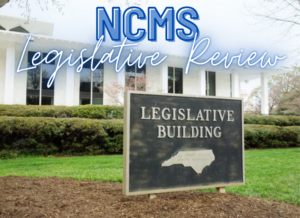
Health took center stage last week as many health-related bills passed each chamber. Legislators in Raleigh faced the crossover deadline, which is a date set by which a bill must pass at least one chamber to continue in the legislative process. The deadline was Thursday, May 4th, and took effect for all bills that do not contain appropriations or fees.
The main bill on the forefront of the health space is SB 20, Care for Women, Children, and Families Act. Among other provisions, it would make it unlawful after the 12th week of gestation to have an abortion in North Carolina with other gestational exceptions for fetal anomalies, rape/incest, and medical emergencies. SB 20 did pass both the House and Senate, now heading to the desk of Governor Roy Cooper, who will likely veto it. NCMS issued a statement opposing the bill and NCMS staff are still working to fully understand how the bill will impact access to reproductive healthcare and create new administrative burdens for members.
With the crossover deadline looming, many NCMS supported bills have passed the House. Below is a summary of some:
HB 576: Healthcare Practitioner Transparency Act – also known as “truth in advertising” – This legislation would require a healthcare practitioner to properly identify their license, certification, or registration (MD, DO, etc.) and would not allow the display of any misleading information.
HB 809: Hospital Violence Prevention Act – This legislation seeks to minimize the likelihood of violence by ensuring health care facilities develop safety protocols to address risks identified by hospital employees, security personnel, and local law enforcement.
HB 560: Diagnostic Imaging Parity – Would provide health coverage parity for breast cancer diagnostic imaging and would require coverage for certain other types of imaging.
HB 739: Update Requirements/Advance Healthcare Directives – This patient-focused legislation facilitates access to health care powers of attorney and advance health care directives by modernizing and enhancing the advance care planning process.
Lastly, the NCMS worked tirelessly to remove language repealing protections for minor consent from HB 808. The law currently provides that minors can give consent for medical services in the diagnosis and treatment of pregnancy, abuse of controlled substances, emotional disturbance, and venereal disease. The NCMS remains opposed to the bill due to its interference with the patient-clinician relationship, but we are pleased that the minor consent protections have been preserved.
